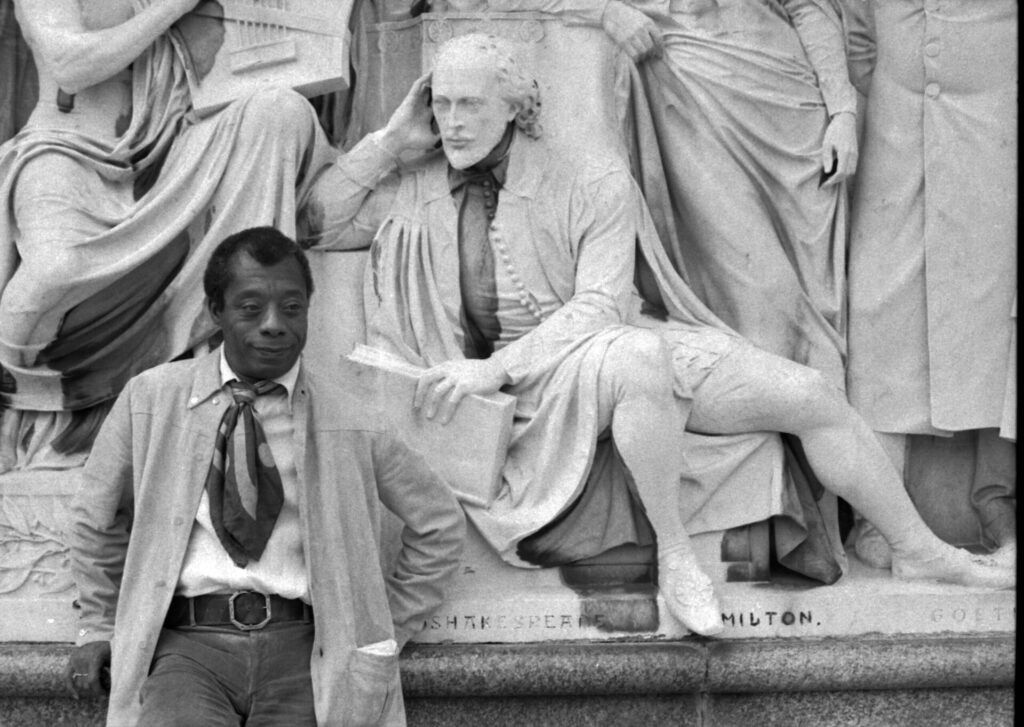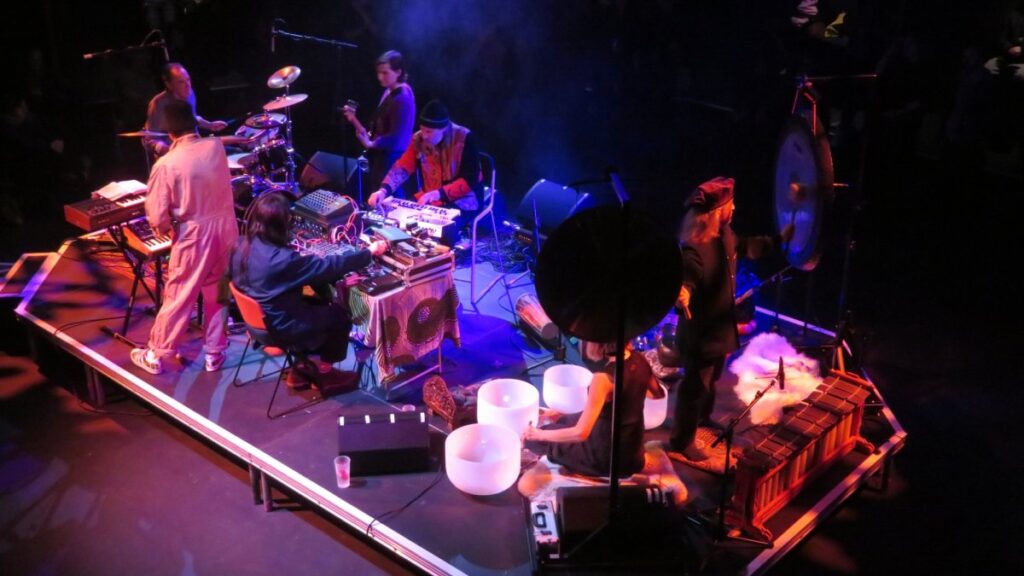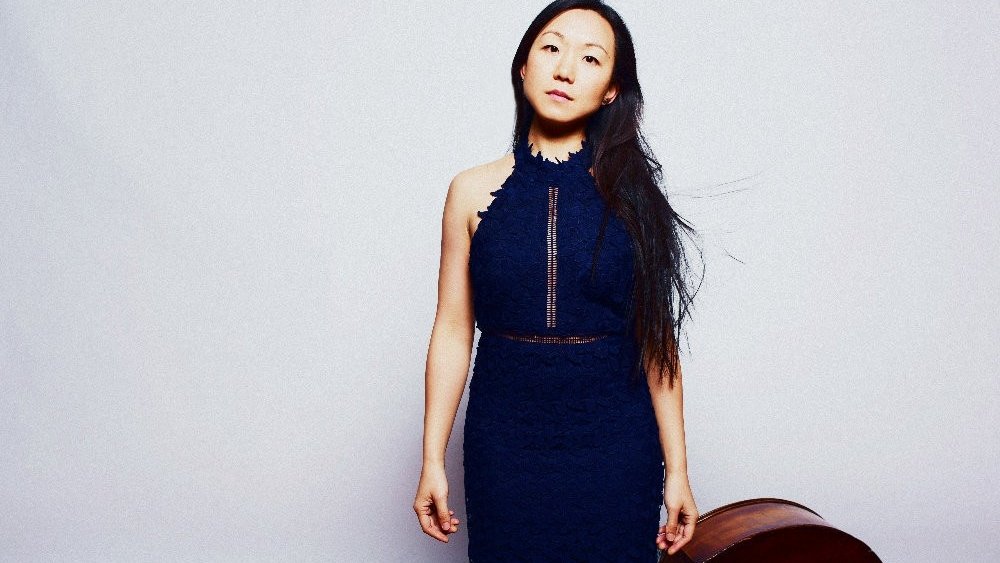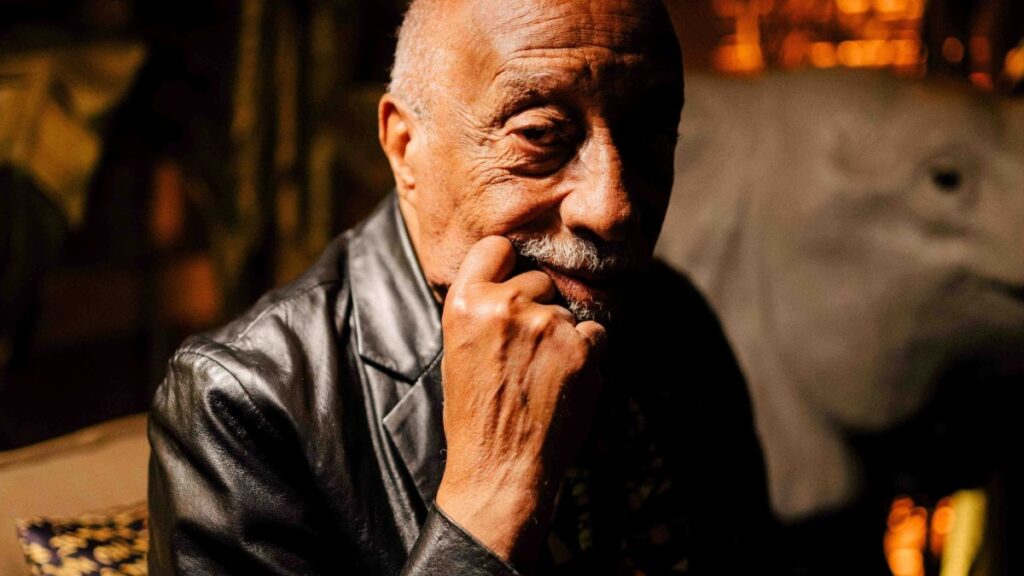EFG London Jazz Festival returns this November with ten days of concerts across concert halls and clubs, churches and community spaces. Next to more tightly curated European festivals like Berlin or Wrocław’s Jazztopad, London can feel a little impersonal. Yet the sheer range and depth of the festival is impressive, while the dash between events is part of the fun. Navigating such a huge programme can be daunting, so let The Quietus be your guide.
The festival has its fair share of legends playing, from the great Malian singer Omou Sangaré to master guitarist Bill Frisell. But the highlight for me is Ethiojazz pioneer Mulatu Astatke, who performs two farewell shows in support of his terrific new album Mulatu Plays Mulatu. Younger artists are the festival’s lifeblood, from Mercury nominee Emma Jean Thackray to the Guildhall students performing with the brilliant bassist-composer Linda May Han Oh.
There are several ambitious projects from UK heavyweights, including Neil Charles’ James Baldwin tribute, Sarathy Korwar’s Drum Ensemble and Anthony Joseph’s new Afrofuturist project Rowing Up River To Get Our Names Back. Camilla George and Shabaka head up The Evolution of British Jazz, a night celebrating 20 years of the Take Five artist development programme. An all-star band of Take Five alumni present compositions by maestros Jason Yarde and John Surman.
Contemporary US voices include drummer, producer and beatmaker Makaya McCraven, saxophonist Tomoki Sanders, Jazz Is Dead head honcho Adrian Younge, and jazz-adjacent post-rockers Tortoise. In one of festival’s avant-garde highlights, Japanese-born, Irish-based pianist Izumi Kamura continues her partnership with the great US percussionist Gerry Hemingway. There’s also a collaboration with K-Music Festival, a Queer Jazz night, and The Jazz Social, a well-needed hub near the Barbican with lunchtime concerts, family friendly events and late night hangs. There’s a huge amount of music to explore, but if you choose only four, make them the following.
Dark Days: Neil Charles, Mark Sanders, Pat Thomas and Cleveland Watkiss

“Dark days, for we know how much there is to be done…” These words, from James Baldwin’s 1980 essay Dark Days, hit hard in the age of Trump, as the gains of the Civil Rights era are clawed back. Neil Charles’ Dark Days suite captures both the darkness and liberatory energy of Baldwin’s writing, with the bassist-composer transforming his prose into music that is graceful, fiery and free. To realise his vision, Charles has assembled a first-rate group of UK jazz musicians: vocalist Cleveland Watkiss, pianist Pat Thomas and drummer Mark Sanders. A recent performance in Newcastle was electrifying, with Watkiss interpreting the text through blues meditations, reggae declamations and electronically layered free improvisation, while Thomas, Charles and Sanders moved between luminous textures and thunderous crescendos.
Charles is renowned for his collaborations with the likes of Elaine Mitchener, Anthony Braxton, Jerry Dammers and Jack DeJohnette, but Dark Days is his debut release as leader, notwithstanding the excellent solo improvised set Low and Beyond for Café Oto’s Takuroku lockdown series. As he explains over email, he came relatively late to Baldwin’s work, beginning with interview clips on YouTube. “I then fell onto the great Cambridge debate [with arch conservative William F Buckley] on a very late Friday night, which blew my mind. Plus, I’ve watched many films and documentaries on Baldwin, especially the documentary by the famous director Horace Ove. This was all a long time before I even thought about diving into the project such as Dark Days.”
During Covid, Charles began leaving pocket-sized Penguin copies of Dark Days around the house. “I didn’t have to burden myself with carrying the book around with me. I felt like it lived with me everywhere I went, so it gave me the opportunity to tap into another narrative throughout my day. By doing so, my emotions and thoughts would waiver considerably, which meant I would inevitably construct separate thought passages towards the book based on how I felt. Dark Days gave me the inspiration to utilise my skill set which is composing and improvisation. It allowed me to reread passages and force me to see other sides of an argument – especially by the pace of Baldwin’s words.
“I knew I had to start composing music to the book when I kept on rereading it, followed by scribbles and highlights in every book. I started with the rhythmic lengths of many sentences, then with the phrasing and paragraphs it became so easy to find patterns. This in turn made me find different musical ideas via each book and it also determined what creative mood I was in at the time. That gave me more musical ideas to play with. Certain ideas didn’t work but the majority did. Excerpts became plentiful and I now have scored more than 70 sections.”
Charles initially wanted to score the piece for an orchestra with a MC or narrator. “I quickly realised this wasn’t possible,” he adds, “so I ended up writing for two vocalists I have had the pleasure of working with, Tara Middleton (Sun Ra Arkestra) and Elaine Mitchner. I know flutist Nicole Mitchell (AACM) and knew she would be great to play, especially being an American citizen. On piano I always wanted Pat Thomas and the same with drums, Mark Sanders. Both players I knew could interpret the music to exactly how they see fit and then the other musicians will dive a little deeper into the charts. Sadly, Covid meant that line up didn’t happen. But in 2022 I was invited to play Cheltenham Jazz Festival and only Mark and Pat could do the dates. So, I asked Cleveland, someone I’ve looked up to whilst growing up on the scene. Cleveland played with Wynton Marsalis and Julien Joseph as well as being a drum & bass vocal icon so I knew he was perfect for the job. By having four musicians at the start we now have a strong trust with each other. And in turn, we have built a solid foundation to allow the project to grow as I first heard it.”
In Newcastle, I was impressed by the sheer range of Cleveland Watkiss’s vocals. At certain points he’s deep and soulful like Gil Scott Heron, at other points he’s going completely off the map, using a looper to extend his vocal techniques. “Cleveland is a maverick and someone I can learn from every time we get to hang out,” says Charles. “His musical journey is so wide I just don’t know anyone like him, so when he asked me to bring his electronic looper I was all for it, knowing he has the experience and sensitivity to shape vocal sounds as he wishes. During the live set we have passages where each member will segue into their own solo. They are completely free to do as they wish. I trust them fully and the deep message of Baldwin and the scoring will come through.”
I ask Charles how audiences have responded to Dark Days so far. “This is a big question,” he says. “I believe people are very sceptical at first because of the topic and its title. And especially the powerful words of Baldwin during this time of tension around the world. But thankfully after we play we always get a joyous uplifting interaction with the audience. I think because of the message and the power of togetherness, the strength and the creativity of the music and the Dark Days text it works out well, especially when we all can learn from one another and challenge narratives.”
Neil Charles: Dark Days takes place at Camden Arts Centre, Thursday 20 November
Charles Hayward presents Sound Is Now!

From legendary post-punk group This Heat to a forthcoming collaboration with rapper-producer Dälek, Charles Hayward has been a questing spirit. The drummer-composer-improviser’s relationship with south London’s The Albany arts centre goes back to the late 70s. “Playing at the Albany is always a joy for me,” he says, “the first time was with This Heat in the old building, then with The Raincoats and Camberwell Now and supporting Abdullah Ibrahim with Mario Diekuuroh and so many other intense moments.” In recent years, Hayward has hosted regular events at the Deptford venue, the latest of which is Sound Is Now!, a platform for collaboration and exploration featuring diverse guests. “I live in Deptford and gigs at the Albany are a deep privilege for me, gives the furthest out sounds perspective and context, keeps the music real.”
The June event featured players from across the jazz, improvised, classical and experimental music scenes – Orphy Robinson, Pat Thomas, Agathe Max, Otto Willberg, Alan Wilkinson – and for EFG London Jazz Festival Hayward has recruited the equally enticing lineup of trumpeter Charlotte Keeffe, guitarist Roberto Sassi, bassist Karl Onibuje and percussionist Lascelles Gordon, with “me on drums and a couple of other players still up in the air.”
The concept for Sound Is Now! Emerges from Hayward’s interest in “sharing music at different points in its development, as well as how it’s made, composed, improvised, the spaces between.” His aim, he explains, is to trigger encounters where the mode of interaction is negotiated in real time. “So that means bringing together players from a wide edge. I first used this strategy in the mid-90s for the Accidents + Emergencies series at the Albany and it’s a crystallisation of how I’ve worked all my life.
“There’s a point where the process becomes intuitive and not really words and when you do talk it sounds clumsy, but there’s a place where the sound someone makes feels right and then other people’s sounds get imagined in different combinations.” Another consideration, he adds, is to “have textures that can function in multiple ways so the music changes and is alive; to focus on the actual stuff of sound and let the audience find shape and meaning.”
To realise this aim, Hayward has the musicians play three different sets. The first is built around compositions, the second features solos, duos, trios, song, folk tunes, improvisation and sound events, while the third is “celebratory and groove centred.”
And what might the audience expect on the night? “Music that isn’t afraid of itself or the audience, an evening that doesn’t put music in fences but uses flow, gradual change and sharp cut contrasts as tools to stretch and question our ears,” replies Hayward, “the opportunity to share music with the audience and between the musicians, to connect. To have music unfold in front of ears, to be taken by surprise.”
Charles Hayward presents Sound Is Now! at The Albany, Friday 21 November
Linda May Han Oh with Guildhall Improvisers Ensemble

One of the finest bassists of her generation, Linda May Han Oh has a raft of star collaborators to her name: Geri Allen, Pat Metheny, Dave Douglas, Joe Lovano and Terri Lyne Carrington, Vijay Iyer. Yet her talents as composer and bandleader shouldn’t be overlooked. From the chamber jazz of 2019’s Aventurine to the inspired doubling of saxophone and wordless vocals on 2023’s Glass Hours, Oh continually takes risks. Her latest album, Strange Heavens, is one of the year’s finest, returning to the chordless acoustic trio format of her 2009 debut Entry. Together with trumpeter Ambrose Akinmusire and drummer Tyshawn Sorey, Oh has stripped her music back to its essence, opening up new possibilities in the process.
The qualities that were already evident on that assured debut – strong melodies, an elastic sense of groove, gutsy yet agile playing – are taken to another level here, reflecting the leaps each musician has made over the years. Akinmusire’s playing is marvel of tender expressionism and extended technique, while Sorey’s cephalopod virtuosity is complemented by a subtle sense of colour and space. Oh plays magnificently, with an articulation and depth of tone that can make a one-note motif sound as vital as a dazzling run. Exploding the mainstream/avant-garde binary, the trio moves in and out of time, from melody to abstraction. There’s an urgency to the performances that suggests the state of the world weighs heavy on Oh. Yet there’s beauty and resilience too, with the Malaysia-born, Australia-raised bassist-composer celebrating immigrant stories – several tracks draw on images from Shaun Tan’s gorgeous 2007 graphic novel The Arrival – and paying tribute to inspirational female composers with takes on Geri Allen’s “Skin” and Melba Liston’s “Just Waiting”.
The latter tracks reflect Oh’s work with the Berklee Institute of Jazz and Gender Justice, an initiative founded by drummer-composer Teri Lynne Carrington that asks what would jazz sound like in a world without patriarchy. “The idea of change can be frightening,” writes Oh in the notes to Strange Heavens, “But we have to figure out how we’re going to build a better world for our kids.”That impulse animates her collaboration with the Guildhall School, whose Improvisers Ensemble will join her for this free concert. The musicians will perform Oh’s compositions in a programme that “promises rich textures, bold improvisation, and captivating musical narratives.”
Tortoise
It’s easy to romanticise certain times and places in music history, but there was something magical about Chicago in the 90s, as punk and indie rock cross-pollinated with jazz, electronic and experimental music, helping to incubate the kind of genre-fluidity that we take for granted today. From post-hardcore roots, the members of Tortoise forged a sound that drew on American minimalism, Ennio Morricone’s spaghetti Western soundtracks, dub, krautrock, musique concrete, jazz, tropicalia, house, techno and hip-hop. While open to the studio-based processes of electronic music, they’ve always been jazz-adjacent, with percussionist Dan Bitney and drummer John Herndon joining members of Chicago Underground Orchestra in the supergroup Isotope 217°. That led to guitarist Jeff Parker, a member of the pioneering AACM musicians’ collective, joining Tortoise on their celebrated 1998 album TNT.
In the years since 2016’s The Catastrophist, Parker has moved to Los Angeles, releasing a series of superb albums which combine progressive jazz with a hip-hop informed sense of groove. Herdon has also relocated to LA, while multi-instrumentalist John McEntire is now in Portland, leaving only Bitney and bassist Doug McCombs in Chicago. As a result, their new album Touch was put together incrementally, with each member bringing in demos for the group to work on when they could get together. The classic Tortoise elements are all there – McEntire’s signature vibraphone and marimba, Herndon’s expansive grooves, McComb’s Bass VI twang, Parker’s elegant guitar figures – but they’re deftly recontextualised. Take the closing ‘Night Gang’, which embeds those Spaghetti Western guitars in a cinematic synthscape, as if Rocco Zifarelli had sat in with Tangerine Dream during the making of their 80s Michael Mann soundtracks. There are plenty of fresh ideas too, from the surprisingly chunky guitar riffage of ‘Vexations’ to the grainy synths of ‘Elka’ and arthouse atmospherics of “Promenade à deux”. Parker flexes his jazz chops on ‘Oganesson’, playing languid chords over percolating synth bass.
Having released their previous albums through Chicago indie Thrill Jockey, Tortoise have moved to International Anthem for Touch. Founded in 2012, International Anthem has been an important platform for a new generation of Chicago and Los Angeles musicians alongside more established figures like Parker and Rob Mazurek. A perfect fit for Tortoise then, representing community, continuity and innovation. Support comes from fellow IA artists Jeremiah Chiu and Marta Sofia Horner, whose synth, tape and violin explorations have seen them collaborate with the late, great Ariel Kalma and Tortoise’s own Jeff Parker.
Tortoise play at the Barbican, Saturday 22 November. For full festival information, go here.


